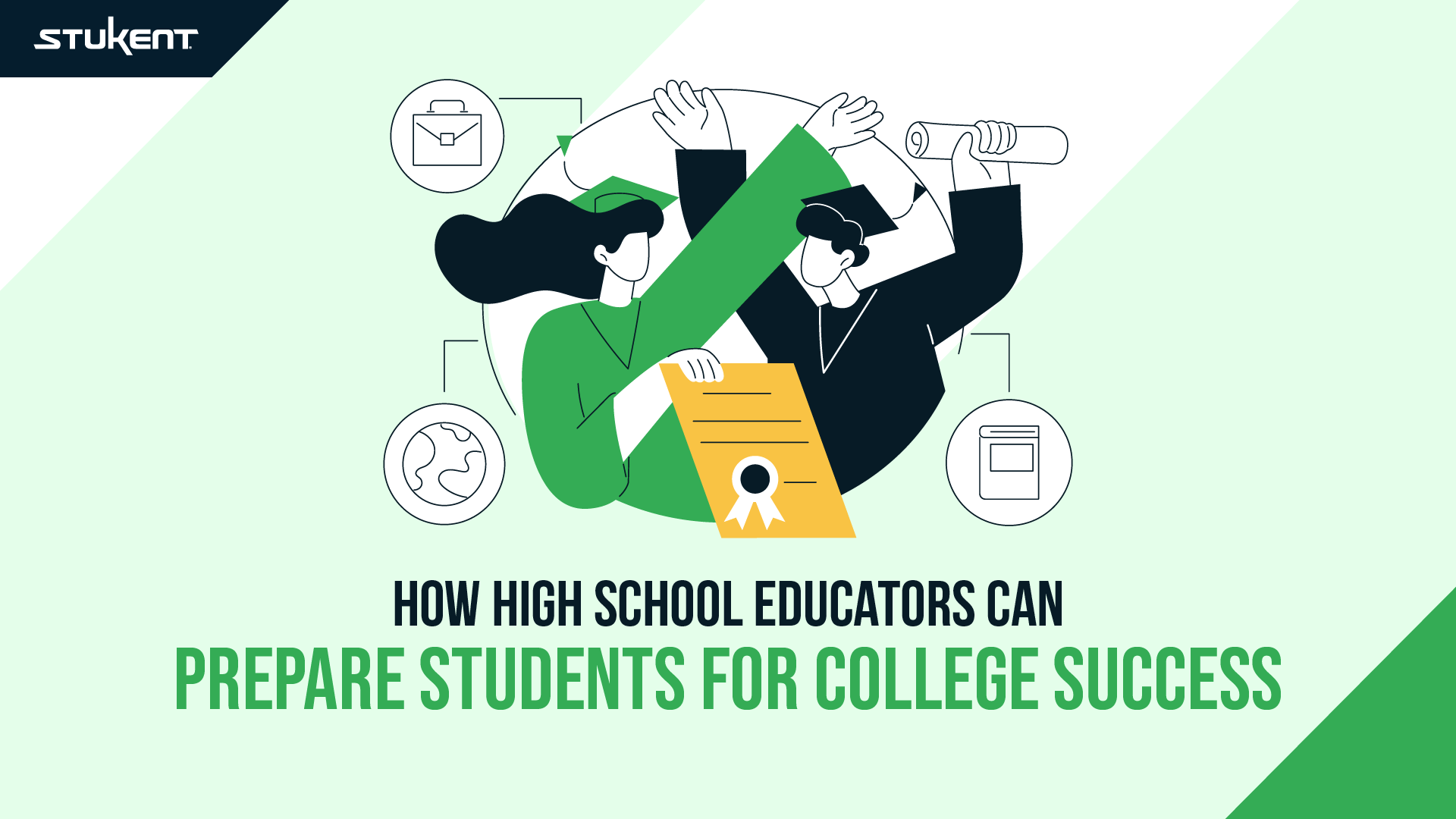Transitioning from high school to college can be a pivotal and sometimes overwhelming experience for students. It’s a time filled with excitement, anticipation, and many questions. As an educator, you have the unique opportunity to guide students through this transition and equip them with the tools they need for success.
From academic readiness to career exploration and from financial planning to digital literacy, helping students prepare for the next step requires a multifaceted approach. Here’s how you can support them in making the leap from high school to college with confidence.
Emphasize Academic Readiness
College readiness starts in the classroom. Setting high academic expectations and encouraging students to engage in challenging coursework can significantly improve their preparedness. Advanced Placement (AP) courses, dual enrollment programs, and other opportunities that offer college credit help boost students’ academic credentials and give them a taste of college-level work.
Beyond rigorous coursework, it’s crucial to develop critical thinking and problem-solving skills. Move beyond traditional lectures and incorporate interactive learning tools that engage students in real-world situations. Stukent® Simternships®, for instance, provide an immersive experience that lets students step into roles like marketing managers, entrepreneurs, and PR officers. These hands-on experiences allow students to apply classroom concepts in a practical setting, helping them understand how their skills translate to the real world.
Time management and effective study habits are also essential. Teaching students how to prioritize tasks, set goals, and manage their schedules prepares them to handle the academic pressures of college. These skills help students juggle their studies, extracurricular activities, and personal responsibilities, creating a solid foundation for success.
Encourage College and Career Exploration
Exploring career options and potential college paths can help students make informed decisions about their futures. Guidance counseling sessions that focus on career pathways can align students’ interests with potential majors and careers, giving them direction as they plan for college. Additionally, organizing college visits and encouraging participation in open houses provides students with firsthand experiences of different institutions, helping them decide where they might feel most at home.
Hands-on experiences, like Stukent Simternships, further enhance career exploration by allowing students to immerse themselves in different industries. With the Stukent All-Access Pass, students can explore careers in marketing, business, and other fields through interactive simulations, gaining practical skills that distinguish them from their peers.
Inviting guest speakers, such as college professors or industry professionals, can provide valuable insights into college and career realities.
“Visiting campuses can give you a real feel for what life at the college is like, helping you decide if it’s the right fit for you,” said Joe Klenk, Director of Marketing at the Pennsylvania Institute of Technology. “You can also attend open houses and information sessions. These events provide valuable insights into the programs, culture, and facilities of each institution. Also, keep your high school documents organized — diplomas, transcripts, and test scores. Staying organized with your academic records ensures a smooth application process and prevents any last-minute scrambles to gather necessary documents.”
These practical steps can make a big difference in how students perceive their college options and manage the application process.
Support College Applications and Financial Planning
Educators can also help students by offering workshops on writing personal statements, obtaining letters of recommendation, and completing applications. Encourage students to seek feedback on their applications from trusted teachers, counselors, or mentors.
“Before submitting your college application, it’s helpful to have someone you trust to review your materials,” said Erik Angelone, Professor of Translation Studies at Kent State University. “Whether it’s a teacher, counselor, or trusted mentor, their feedback can provide valuable insights and help you present your best self to admissions committees. After [you’ve been] working on an application for a few weeks, a new perspective can help catch minor mistakes or identify areas of confusion. They can also give you ideas for expanding on a topic that can make your application stronger.”
Financial planning is another critical component of college readiness. Educators can help by providing guidance on the financial aspects of the college search, including understanding costs, scholarships, and financial aid.
“Keep finances in mind for every step of your college search,” advised Ben Iboshi, a Marketing Coordinator at Achievable. “Too many people wait until their final decision to determine which schools they can afford. Making a budget early on and considering the amount of financial aid each school offers can save you from stress. It also prevents you from wasting time with applications that won’t lead anywhere.”
“Looking at finances doesn’t just help you eliminate schools, either,” he continued. “Scholarships can attract you to schools you hadn’t even considered. Many high-achieving students don’t realize that merit scholarships can pay for most or all of their education at the right schools. Finding schools that are generous with need-based aid can similarly open up new possibilities. It only takes some extra research early on to shape your college search around these criteria.”
Encouraging students to research financial options early can help them make more informed decisions about where to apply and how to manage the costs of college.
Guide Portfolio Building
Building a strong academic and extracurricular portfolio is essential for students preparing for college. A well-crafted portfolio showcases their strengths, skills, and achievements, making their applications stand out to admissions committees. Highlight specific accomplishments, such as Stukent certifications earned through simulations, to add a practical, career-oriented dimension to their profiles.
However, it’s important for students to focus on their best achievements rather than overwhelming admissions officers with a list of every activity they’ve participated in. Lisa Tsou, an Educational Advisor at Aces College Essay Coaching, advises:
“Applying to college is stressful! It’s also a lot of work, so it’s easy to lose sight of the big picture. Admissions officers are going through tens of thousands of applications, trying to put together a class of students who will be living together as a community for four years. With each application, they’re trying to figure out who the student is and what they would bring to that community.”
“The mistake students often make is to try to throw the ‘kitchen sink’ into their applications, including every team they’ve ever been on, every activity they’ve ever been a part of, and every prize they’ve ever won. These ‘stuffed’ applications are too much! They’re hard to understand, and with so many little things, nothing stands out about them in the admissions pile.
“What’s much better for students is to focus their application on one really good reason for their admission, like a major passion they’ve pursued, a significant challenge they’ve grown from, or a unique worldview they can bring to the school. By giving focus to your application with things like your essays and activities list, you’re making it really clear what you bring to the table. That makes it so much easier for your application to stand out in that big pile, and it gives admissions offices a really good reason to want you for their class!”
Encourage students to build a focused, compelling narrative in their applications that highlights what makes them unique.
Incorporate Technology and Digital Literacy
With the growing reliance on digital platforms in education, it’s essential to prepare students for the technological demands of college. Incorporate digital tools and resources into your curriculum that mimic the tech-driven learning environments students will encounter in college. This approach not only makes students comfortable with technology but also enhances their research and information literacy skills.
Teach students how to critically evaluate sources, conduct academic research, and use digital tools effectively. Familiarizing them with online learning formats, such as LMS platforms or online courses, will also ease their transition to college, where blended and fully online courses are becoming more common.
By implementing these strategies, high school educators can provide students with the foundation they need to succeed in college and beyond. Each of these steps equips students with the skills and knowledge to navigate the college experience. Leveraging innovative tools like Stukent Simternships provides students with real-world experiences that not only strengthen their college applications but also prepare them for their future careers. Encourage your students to embrace these opportunities, helping them make a smooth and confident transition from high school to higher education.
To learn about Simternships and courseware and to get FREE instructor access to Stukent materials, visit our website.






